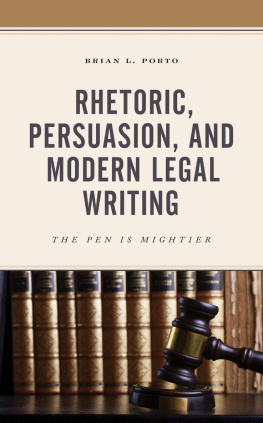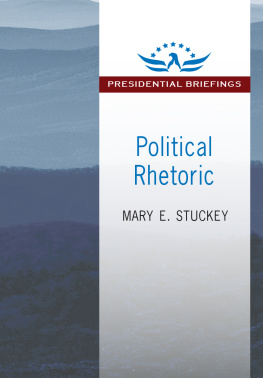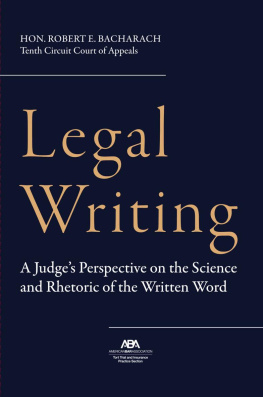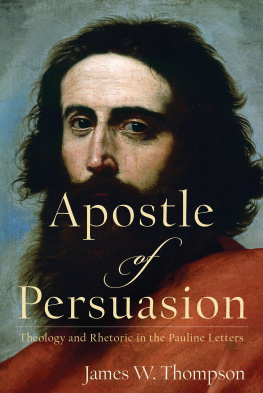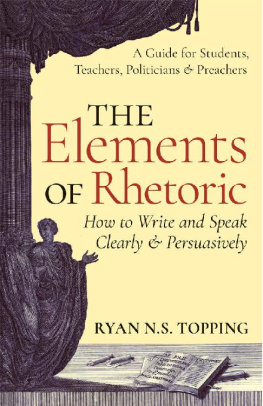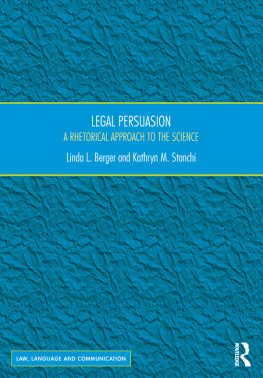Brian L. Porto - Rhetoric, Persuasion, and Modern Legal Writing: The Pen Is Mightier
Here you can read online Brian L. Porto - Rhetoric, Persuasion, and Modern Legal Writing: The Pen Is Mightier full text of the book (entire story) in english for free. Download pdf and epub, get meaning, cover and reviews about this ebook. year: 2021, publisher: Lexington Books, genre: Romance novel. Description of the work, (preface) as well as reviews are available. Best literature library LitArk.com created for fans of good reading and offers a wide selection of genres:
Romance novel
Science fiction
Adventure
Detective
Science
History
Home and family
Prose
Art
Politics
Computer
Non-fiction
Religion
Business
Children
Humor
Choose a favorite category and find really read worthwhile books. Enjoy immersion in the world of imagination, feel the emotions of the characters or learn something new for yourself, make an fascinating discovery.
- Book:Rhetoric, Persuasion, and Modern Legal Writing: The Pen Is Mightier
- Author:
- Publisher:Lexington Books
- Genre:
- Year:2021
- Rating:3 / 5
- Favourites:Add to favourites
- Your mark:
- 60
- 1
- 2
- 3
- 4
- 5
Rhetoric, Persuasion, and Modern Legal Writing: The Pen Is Mightier: summary, description and annotation
We offer to read an annotation, description, summary or preface (depends on what the author of the book "Rhetoric, Persuasion, and Modern Legal Writing: The Pen Is Mightier" wrote himself). If you haven't found the necessary information about the book — write in the comments, we will try to find it.
Brian L. Porto: author's other books
Who wrote Rhetoric, Persuasion, and Modern Legal Writing: The Pen Is Mightier? Find out the surname, the name of the author of the book and a list of all author's works by series.
Rhetoric, Persuasion, and Modern Legal Writing: The Pen Is Mightier — read online for free the complete book (whole text) full work
Below is the text of the book, divided by pages. System saving the place of the last page read, allows you to conveniently read the book "Rhetoric, Persuasion, and Modern Legal Writing: The Pen Is Mightier" online for free, without having to search again every time where you left off. Put a bookmark, and you can go to the page where you finished reading at any time.
Font size:
Interval:
Bookmark:
Rhetoric, Persuasion, and
Modern Legal Writing
Rhetoric, Persuasion, and
Modern Legal Writing
The Pen Is Mightier
Brian L. Porto
LEXINGTON BOOKS
Lanham Boulder New York London
Published by Lexington Books
An imprint of The Rowman & Littlefield Publishing Group, Inc.
4501 Forbes Boulevard, Suite 200, Lanham, Maryland 20706
www.rowman.com
6 Tinworth Street, London SE11 5AL, United Kingdom
Copyright 2020 by The Rowman & Littlefield Publishing Group, Inc.
All rights reserved. No part of this book may be reproduced in any form or by any electronic or mechanical means, including information storage and retrieval systems, without written permission from the publisher, except by a reviewer who may quote passages in a review.
British Library Cataloguing in Publication Information Available
Library of Congress Cataloging-in-Publication Data
Library of Congress Control Number: 2020930448
ISBN 978-1-4985-6891-3 (cloth: alk. paper)
ISBN 978-1-4985-6892-0 (electronic)
 TM The paper used in this publication meets the minimum requirements of American National Standard for Information Sciences Permanence of Paper for Printed Library Materials, ANSI/NISO Z39.48-1992.
TM The paper used in this publication meets the minimum requirements of American National Standard for Information Sciences Permanence of Paper for Printed Library Materials, ANSI/NISO Z39.48-1992.
To two thoughtful Hoosiers who eased my transition
from law student to lawyer:
Leonard Frommthe law students advocate;
Patrick Baudeteacher, scholar, inspiration.
Nobody writes an academic monograph alone, even when only one authors name appears on the front cover. The advice and counsel of colleagues almost always shape and guide the authors thinking, improving the product that finally emerges from the writing process. This book conforms to that rule. Discussions with many colleagues clarified its focus and enhanced its prospects for publication. I am indebted to Steve Dycus, Ross Guberman, Greg Johnson, Reed Loder, Phil Meyer, Sean Nolon, Dave Schultz, Kristen Tiscione, and Rebecca Zietlow for the insights they offered at various stages of the project. I am also indebted to the wonderful partnership between the Legal Writing Institute (LWI) and LexisNexis that has supported my work with an LWI Scholarship Grant.
Others deserve honorable mention too. My students at Vermont Law School, in our regular class sessions, provide a warm and supportive, yet intellectually rigorous, forum for presenting and testing both substantive ideas about legal writing and methods for teaching it. Our discussions, framed by the verdant beauty of the Green Mountains, have helped to inform this book. Also at Vermont Law School, librarian Michele LaRose located numerous research materials for me expeditiously, and my research assistant, Hannah Clarisse, ensured that my quotations and citations were accurate and complete, which they would not have been without her diligence and skill. The anonymous reviewer who read the manuscript for Rowman & Littlefield also deserves my thanks because the resulting critique prompted me to shorten the book while also rebalancing it to include more rhetorical analysis and less biography.
I am grateful for several opportunities that became available during the writing process to discuss material pertinent to the book, in venues that ranged from informal faculty gatherings at Vermont Law School to the annual meeting of the New England Consortium of Legal Writing Teachers (NECLWT) to the pages of the Vermont Bar Associations quarterly journal. And I am grateful to the two editors at Rowman & Littlefield with whom I worked: Emily Roderick, who acquired the book and Becca Beurer, who guided it to completion. Each editor was a pleasure to work with.
Finally, I extend a deeply appreciative thank you to my wife, Sherrie Greeley, for her steadfast love and support and her sharp proofreaders eye. This book is more pleasant to read and easier to understand because of her efforts. Any lingering errors or omissions, substantive or mechanical, are my responsibility alone.
Aristotle observed long ago that it is not enough to know what to say; one must know how to say it. To borrow an old metaphor, itself a classical rhetorical tool, great orators and writers show us the difference between a master and a journeyman in the venerable craft of persuasion.
Some American presidents have been masters of persuasion. They understood Aristotles message perfectly. They knew how to say it, meaning how to devise arguments and to order them in a speech in a logical way that ensured comprehension by the reader or listener and how to use words and expressions likely to inspire and to endure in the public consciousness. For example, the words of President John F. Kennedys Inaugural Address, delivered on a cold January day in 1961, still warm the heart and stir the spirit more than a half-century later.
Let the word go forth from this time and place, to friend and foe alike, that the torch has been passed to a new generation of Americans, born in this century, tempered by war, disciplined by a hard and bitter peace, proud of our ancient heritage, and unwilling to witness or permit the slow undoing of those human rights to which this nation has always been committed, and to which we are committed today at home and around the world.
Why are President Kennedys words still so powerful today? One likely reason is their subject: the timeless quest for human freedom and the call to action in pursuit of it. But an equally important reason is Kennedys use of rhetorical techniques to highlight that subject and enliven his description of it. Employing the rhetorical canon known as invention, which concerns the creation of arguments, he developed an argument from circumstance, which encourages an audience to act by showing its members what is possible if they work together. That argument exhorted a new generation of Americans, of which Kennedy was part, to seize the torch of leadership and carry it forward to expand human freedom around the world. The Peace Corps, founded during the Kennedy administration, embodied the promise in the presidents words.
The other rhetorical technique evident in President Kennedys speech is style, which refers to the speakers or writers word choices in a particular discourse. Kennedy hurried the rhythm of his words to convey an urgent message to Americansespecially young Americansto join him in working for peace, freedom, and international understanding, thereby countering the influence of the Soviet Union among developing countries.
Thus, the application of rhetorical devices to a grave and preeminent subject has ensured the continued vitality of President Kennedys Inaugural Speech. To grasp the importance of rhetoric in that speech, consider the likely effect if Kennedy had expressed the same ideas by saying, A new generation of Americans must now assume the responsibilities of leadership and promote around the world the human rights we hold dear. Would those words be remembered as well and quoted as often as the words he actually spoke? It seems unlikely.
In exhorting Americans, through rhetoric, to join forces and pursue a brighter future together, President Kennedy honored a tradition established by his predecessors in the White House. One of those predecessors, Abraham Lincoln, was among our most talented rhetorician-presidents. He also used an argument from circumstance to persuade Americans to work together to make peace possible, in Lincolns case, peace between the North and the South after the Civil War. At the close of his Second Inaugural Address, delivered on March 4, 1865, as war raged on, President Lincoln spoke the following words, which still stir the emotions more than 150 years after he spoke them.
Next pageFont size:
Interval:
Bookmark:
Similar books «Rhetoric, Persuasion, and Modern Legal Writing: The Pen Is Mightier»
Look at similar books to Rhetoric, Persuasion, and Modern Legal Writing: The Pen Is Mightier. We have selected literature similar in name and meaning in the hope of providing readers with more options to find new, interesting, not yet read works.
Discussion, reviews of the book Rhetoric, Persuasion, and Modern Legal Writing: The Pen Is Mightier and just readers' own opinions. Leave your comments, write what you think about the work, its meaning or the main characters. Specify what exactly you liked and what you didn't like, and why you think so.

